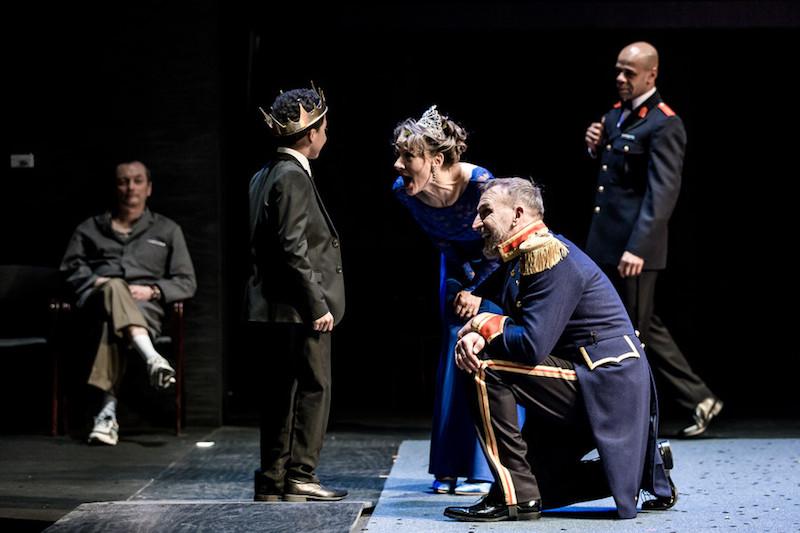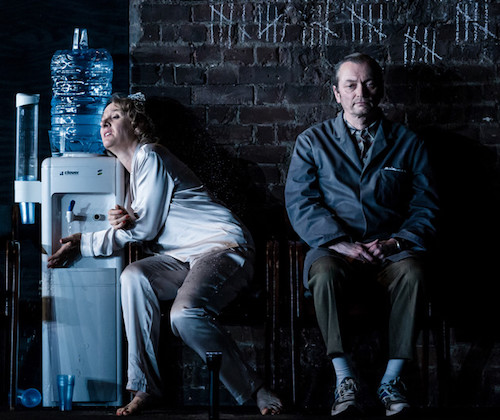Macbeth, RSC, Barbican review - Shakespeare's blood-boltered tragedy, tense but flawed | reviews, news & interviews
Macbeth, RSC, Barbican review - Shakespeare's blood-boltered tragedy, tense but flawed
Macbeth, RSC, Barbican review - Shakespeare's blood-boltered tragedy, tense but flawed
Horror flick echoes fail to meet all the play's challenges

It has been said before: Macbeth's reputation for bad luck has more to do with the difficulty of bringing off a successful production than the supernatural elements in the play.
The challenges are clear enough. The Weird Sisters suggest a witchy power it is difficult for modern audiences to accept. The ghost of Banquo (do we see him or don't we?) presents another potential difficulty. The Porter, the "comic relief", talks endlessly in satirical terms about equivocation, with sideways references to the Gunpowder Plot - the narrowly escaped horror which resonated when the play was first performed in 1606 - but this urgency would be lost on an unprimed audience now. And making him funny in 2018 is a stretch.
 Director Polly Findlay squares up to the task with admirable chutzpah. The result, however, is a gallimaufry of too many ideas, not all of them equally successful. But whatever else she brings to the table, Macbeth himself and Lady Macbeth must be at the heart of matters. I saw the RSC's production screened from Stratford in April, since when Christopher Eccleston has added greater depth and nuance for its Barbican run. He was always credible as a no-nonsense fighter; now he has a bleak humour and a subtler grip on the character's psychology. But he's still a man's man, jauntily sending up the Weird Sisters' prophecies with Banquo. Niamh Cusack is a complex Lady Macbeth, taking charge of the situation in maternal rather than fiendish fashion. She calls on the spirits to unsex her with an almost embarrassed determination and when she makes her terrible speech about being willing to dash out her baby's brains, it has a palpable effect on both her husband and herself.
Director Polly Findlay squares up to the task with admirable chutzpah. The result, however, is a gallimaufry of too many ideas, not all of them equally successful. But whatever else she brings to the table, Macbeth himself and Lady Macbeth must be at the heart of matters. I saw the RSC's production screened from Stratford in April, since when Christopher Eccleston has added greater depth and nuance for its Barbican run. He was always credible as a no-nonsense fighter; now he has a bleak humour and a subtler grip on the character's psychology. But he's still a man's man, jauntily sending up the Weird Sisters' prophecies with Banquo. Niamh Cusack is a complex Lady Macbeth, taking charge of the situation in maternal rather than fiendish fashion. She calls on the spirits to unsex her with an almost embarrassed determination and when she makes her terrible speech about being willing to dash out her baby's brains, it has a palpable effect on both her husband and herself.
Children lost, children present but endangered, children as part of a normal happy family (the Macduffs are such before tyranny strikes) and children yet to be born contribute to an important theme here. Macbeth and his wife are in a chronic state of grief at the death of one or more children, perhaps needing to fill a yawning gap in their lives. Other people's children are a constant reminder of what they do not have. Rarely has the relationship between Banquo (Raphael Sowole) and Fleance been more touchingly played and the reaction of Edward Bennett (pictured above) as Macduff to the news of the loss of his family is heartbreaking.
Even the Weird Sisters are children, three small girls in neat red dresses (thank goodness the pink pyjamas seen at Stratford have been tipped into an eternal laundry basket) whose pedigree owes a good deal to The Shining. Played on press night with admirable discipline, chanting in unison and staring meaningfully at Macbeth, they do muster a certain menace, but this seems mainly a way of appeasing 21st-century non-believers in magic.
The passing of time, the lack of a future for the Macbeth couple once Duncan is dead, is made explicit by a digital clock counting down from that first murder to Macbeth's death. The tally of murders in Macbeth's reign of terror is matter-of-factly chalked up by the Porter much as a prisoner might chalk up the passing days. Incidentally, given this emphasis on time and tension, it seems odd to break the momentum with an interval. The Porter (Michael Hodgson, pictured above with Niamh Cusack, washing her hands while asleep), constantly onstage, is a combination of servant - sullenly wielding a carpet sweeper when not speaking his character's familiar lines - and dispassionate recorder of human frailty. He is both in the action and out of it, knowing everything and nothing, human and abstract and sometimes oddly amusing, helpfully pointing out Macduff to Macbeth for the final duel, for instance. In the end, he has too many functions and is simply distracting.
The Porter (Michael Hodgson, pictured above with Niamh Cusack, washing her hands while asleep), constantly onstage, is a combination of servant - sullenly wielding a carpet sweeper when not speaking his character's familiar lines - and dispassionate recorder of human frailty. He is both in the action and out of it, knowing everything and nothing, human and abstract and sometimes oddly amusing, helpfully pointing out Macduff to Macbeth for the final duel, for instance. In the end, he has too many functions and is simply distracting.
The idea of cyclical power struggles is not new in productions of Macbeth, but here Findlay underlines the likelihood of repetition. The clock begins ticking and the child witches appear the moment Malcolm is crowned. Young Fleance enters, a reminder of the prophecy that Banquo's line will sooner or later, by whatever means, take the crown.
The central area of the wide Barbican stage resembles the thrust of the Royal Shakespeare Theatre in Fly Davis's design and an upper stage is employed to advantage. The most successful productions of Macbeth have often been in small, intimate spaces and here the action sometimes seems dissipated. The next attempt to meet the Macbeth challenge will be in the candle-lit Sam Wanamaker Playhouse. It will be interesting to see how this darkest of plays fares in that environment.
The future of Arts Journalism
You can stop theartsdesk.com closing!
We urgently need financing to survive. Our fundraising drive has thus far raised £49,000 but we need to reach £100,000 or we will be forced to close. Please contribute here: https://gofund.me/c3f6033d
And if you can forward this information to anyone who might assist, we’d be grateful.

Subscribe to theartsdesk.com
Thank you for continuing to read our work on theartsdesk.com. For unlimited access to every article in its entirety, including our archive of more than 15,000 pieces, we're asking for £5 per month or £40 per year. We feel it's a very good deal, and hope you do too.
To take a subscription now simply click here.
And if you're looking for that extra gift for a friend or family member, why not treat them to a theartsdesk.com gift subscription?
more Theatre
 The Weir, Harold Pinter Theatre review - evasive fantasy, bleak truth and possible community
Three outstanding performances in Conor McPherson’s atmospheric five-hander
The Weir, Harold Pinter Theatre review - evasive fantasy, bleak truth and possible community
Three outstanding performances in Conor McPherson’s atmospheric five-hander
 Dracula, Lyric Hammersmith review - hit-and-miss recasting of the familiar story as feminist diatribe
Morgan Lloyd Malcolm's version puts Mina Harkness centre-stage
Dracula, Lyric Hammersmith review - hit-and-miss recasting of the familiar story as feminist diatribe
Morgan Lloyd Malcolm's version puts Mina Harkness centre-stage
 The Code, Southwark Playhouse Elephant review - superbly cast, resonant play about the price of fame in Hollywood
Tracie Bennett is outstanding as a ribald, riotous Tallulah Bankhead
The Code, Southwark Playhouse Elephant review - superbly cast, resonant play about the price of fame in Hollywood
Tracie Bennett is outstanding as a ribald, riotous Tallulah Bankhead
 Reunion, Kiln Theatre review - a stormy night in every sense
Beautifully acted, but desperately grim drama
Reunion, Kiln Theatre review - a stormy night in every sense
Beautifully acted, but desperately grim drama
 The Lady from the Sea, Bridge Theatre review - flashes of brilliance
Simon Stone refashions Ibsen in his own high-octane image
The Lady from the Sea, Bridge Theatre review - flashes of brilliance
Simon Stone refashions Ibsen in his own high-octane image
 Romans: A Novel, Almeida Theatre review - a uniquely extraordinary work
Alice Birch’s wildly epic family drama is both mind-blowing and exasperating
Romans: A Novel, Almeida Theatre review - a uniquely extraordinary work
Alice Birch’s wildly epic family drama is both mind-blowing and exasperating
 The Producers, Garrick Theatre review - Ve haf vays of making you laugh
You probably know what's coming, but it's such great fun!
The Producers, Garrick Theatre review - Ve haf vays of making you laugh
You probably know what's coming, but it's such great fun!
 Not Your Superwoman, Bush Theatre review - powerful tribute to the plight and perseverance of Black women
Golda Rosheuvel and Letitia Wright excel in a super new play
Not Your Superwoman, Bush Theatre review - powerful tribute to the plight and perseverance of Black women
Golda Rosheuvel and Letitia Wright excel in a super new play
 Cow | Deer, Royal Court review - paradox-rich account of non-human life
Experimental work about nature led by Katie Mitchell is both extraordinary and banal
Cow | Deer, Royal Court review - paradox-rich account of non-human life
Experimental work about nature led by Katie Mitchell is both extraordinary and banal
 Deaf Republic, Royal Court review - beautiful images, shame about the words
Staging of Ukrainian-American Ilya Kaminsky’s anti-war poems is too meta-theatrical
Deaf Republic, Royal Court review - beautiful images, shame about the words
Staging of Ukrainian-American Ilya Kaminsky’s anti-war poems is too meta-theatrical
 Laura Benanti: Nobody Cares, Underbelly Boulevard Soho review - Tony winner makes charming, cheeky London debut
Broadway's acclaimed Cinderella, Louise, and Amalia reaches Soho for a welcome one-night stand
Laura Benanti: Nobody Cares, Underbelly Boulevard Soho review - Tony winner makes charming, cheeky London debut
Broadway's acclaimed Cinderella, Louise, and Amalia reaches Soho for a welcome one-night stand
 The Pitchfork Disney, King's Head Theatre review - blazing with dark energy
Thrilling revival of Philip Ridley’s cult classic confirms its legendary status
The Pitchfork Disney, King's Head Theatre review - blazing with dark energy
Thrilling revival of Philip Ridley’s cult classic confirms its legendary status
